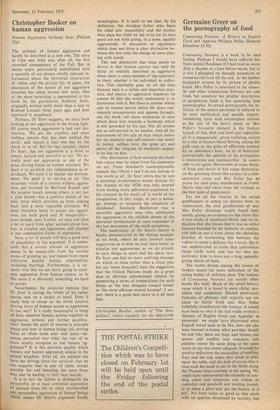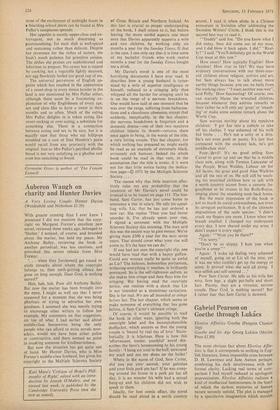Germaine Greer on the pornography of food
Consuming Passions is a book to be read
fasting. Perhaps I should have suffered less from mental flatulence if I had read no more than a chapter at a time before meals, but as it was I ploughed on through mountains of centuries-old food till the end. As the hidden dustjacket evinces by its picture of phallic bread, Mrs Pullar is interested in the seman- tic and other connections between sex and food, but somehow her graphic description of gargantuan feeds is less appetising than pornographic. In sexual pornography the in- tricacy of the sexual encounter is reduced to its most mechanical and specific aspects, foundering upon such meaningless notions as the size of the hero's penis; so Mrs Pullar's favourite element is the fantasy 'tumult of fish, flesh and fowl and vegetables all in a masquerade', given titillating variety by a tide of human blood flowing among the gold cups or the gales of effluvium emitted by an alderman's bum. As in all hard-core pornography the appetite of the protagonist is omnivorous and inexhaustible: he vomits only to eat again. Hecatombs of oxen, flocks of birds and shoals of fish range themselves on the groaning board like corpses in a con- centration camp and Mrs Pullar has no praise for such puny trenchermen as Frank Harris who reel away from the carnage at the first sight of green meat.
Yet for all her interest in the sexual gratification of eating (as distinct from its counterpart, the oral gratification of sex) Mrs Pullar dismisses cockle bread sum- marily, giving no evidence for her claim that it was made of menstrual blood, and no in- dication that she knows that it was so called because kneaded by the buttocks or cockles, and tells us nova word about the charming practice of marinading fish between the vulvae to make a delicacy for a lover. She is too sophisticated to Claim that aphrodisiac foods really work and too far into her particular kink to leave out a long appendix giving details of them.
The reader ferrets among the towers of broken meats for some indication of the eating habits of ordinary men. The sources
of Consuming Passions are mostly other books like itself. Much of the social history
upon which it is based is mere cliché, pre- judice and conjecture. Heated puritanical fantasies of gluttony and orgiastic sex are taken as literal truth and Mrs Pullar faithfully transliterates the fantasy. It would have been so nice if she had really written a 'History of English Food and Appetite' as promised: we might have discovered what English bread used to be like, how old ales
were brewed at home, what porridge should be and why there are baps and butties and scones and muffins and crumpets and pikelets—never the same thing or the same name in any two towns adjacent. It would be good to rediscover the muscadine of wedding days and the tiny cakes that stood in piles upon the table, and the dish of cream that a man took his maid to eat in the fields along the Thames when courting in the spring. We might have rediscovered the etiquette of sen- ding cakes and conserves and cutlets as courtship and goodwill and inviting friends in to share a joint and 'get the beauty of it hot'. No food tastes as good as that eaten with an appetite sharpened by scarcity, but
none of the excitement of midnight feasts in a boarding-school dorm can be found at Mrs Pullar's sumptuous spreads.
Her appetite is mostly upper-class and ex- travagant, not so much discerning as gourmandising, for each dish is well-spiced and sustaining rather than delicate. Despite her reverence for the riches of nature, she hasn't much patience for primitive cuisine. The dishes she praises are sophisticated and laborious to prepare. No oyster but is ruined by cooking, not a vegetable lightly steamed, nor egg flawlessly boiled nor good cup of tea.
The universal perversion of English ap- petite which has resulted in the appearance of a sweet-shop in every tiniest hamlet in the land is not mentioned by Mrs Pullar either, although there must be a fascinating ex- planation of why Englishmen of every age, sex and class like to have a sweet in their mouths and so often. Much of the eating Mrs Pullar delights in is token eating like sweet-sucking or over-eating, a substitute for something else. There is a connection between eating and sex to be sure, but it is equally sure that those who eat lollipops moulded on a cast of Jimi Hendrix's penis would recoil from any proximity with the original. Just so Mrs Pullar's petrified phallic bread is not very satisfying as a phallus and even less sustaining as bread.
Germaine Greer is author of 'The Female Eunuch'



































 Previous page
Previous page